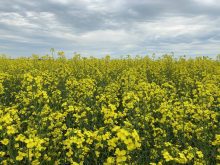CNS Canada — The Indian government has raised its import tariff for chickpeas for a second time, this time from 40 per cent to 60 per cent.
The government said Thursday in the Gazette of India its tariff is to be imposed immediately, due to circumstances which make it necessary to take immediate action.
Reuters reported Wednesday that India’s cabinet had approved doubling state purchases of oilseeds and pulses from farmers, in a bid to boost local output and prevent distressed sales.
Read Also

Pea, lentil outlooks have some positive signals – Penner
As pulse growers consider what to plant this spring, Chuck Penner of Leftfield Commodities Research said there is some optimism in the Canadian pulse market. Penner gave a presentation at the Saskatchewan Pulse Growers meeting in Swift Current on Feb. 4.
India originally placed a 30 per cent tariff on imports of chickpeas and lentils on Dec. 21, which had followed a 50 per cent tariff on pea imports on Nov. 8 — the maximum allowed under World Trade Organization rules.
The chickpea duty had been raised to 40 per cent on Feb. 7.
The tariffs were placed in order to support Indian farmers, who faced lower commodity prices following large world crops of pulses.
The Indian government has previously said it wants to reach self-sufficiency for pulses, though many analysts have said that isn’t possible, as India relies on variable monsoon rains for its growing season.
Canadian Prime Minister Justin Trudeau last week visited India and reached an agreement with Indian Prime Minister Narendra Modi on fumigation issues which Canadian pulses had faced upon on import into the country.
The joint statement announcing the agreement didn’t mention import tariffs.
Last year Canada exported 10,000 tonnes of chickpeas to India, according to Statistics Canada.
















